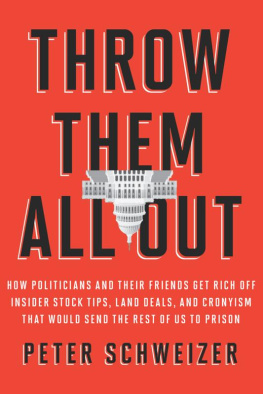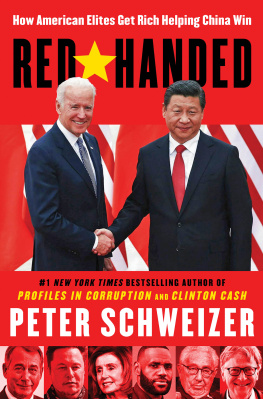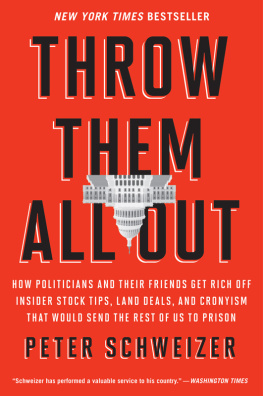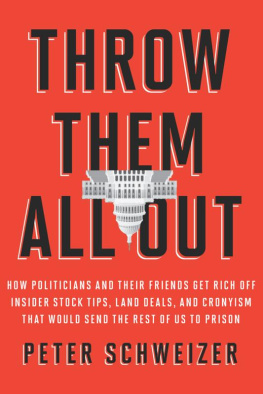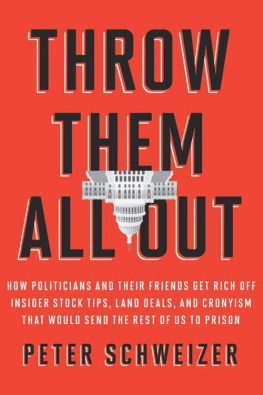Copyright 2011 by Peter Schweizer
All rights reserved
For information about permission to reproduce
selections from this book, write to Permissions,
Houghton Mifflin Harcourt Publishing Company,
215 Park Avenue South, New York, New York 10003.
www.hmhbooks.com
Library of Congress Cataloging-in-Publication Data
Schweizer, Peter, date.
Throw them all out: how politicians and their friends get rich
off insider stock tips, land deals, and cronyism that would
send the rest of us to prison / Peter Schweizer.
p. cm.
Includes bibliographical references and index.
ISBN 978-0-547-57314-4
1. Political corruptionUnited States. I. Title.
JK 2249. S 35 2012
364.1'3230973dc23 2011036523
Book design by Melissa Lotfy
Printed in the United States of America
DOC 10 9 8 7 6 5 4 3 2 1
For Maria Duffus
Thanks so much for encouraging your brother all these years
There is so much honest graft in this big town that they would be fools to go in for dishonest graft.
GEORGE WASHINGTON PLUNKITT
List of Illustrations
Chapter 1
Congressional trading in Teva Pharmaceuticals, 2009
Congressional trading in Amgen, 2007
Chapter 2
Congressman Rahm Emanuel's trading in Freddie Mac, 2003
Chapter 3
Congresswoman Nancy Pelosi's trading in Visa, 2008
Chapter 4
Congressman Dennis Hastert's Illinois land deal, 2005
Congresswoman Nancy Pelosi's San Francisco real estate and light rail funding
Senator Harry Reid's Colorado River bridge and real estate
Chapter 5
Department of Energy loan recipients: Obama-connected companies vs. unconnected companies
Department of Energy grant and loan recipients from the Obama campaign's National Finance Committee
"Return on investment" to members of Obama's National Finance Committee
Department of Energy grant and loan recipients from among the Obama campaign's bundlers and large donors
Chapter 8
Annual lobbying and campaign contributions by hedge funds
Introduction
The Government Rich
The mere proposal to set the politician to watch the capitalist has been disturbed by the rather disconcerting discovery that they are both the same man. We are past the point where being a capitalist is the only way of becoming a politician, and we are dangerously near the point where being a politician is much the quickest way of becoming a capitalist.
G. K. CHESTERTON
Just follow the money.
"DEEP THROAT" TO BOB WOODWARD
W E'VE ALL HEARD about the New Rich. Once, they were the Oil Rich. Then they were the Silicon Valley Rich. The Dot-Com Rich. Now it's time to meet the New New Rich: the Government Rich.
For the Government Rich, insider deals, insider trading, and taxpayer money have become a pathway to wealth. They get to walk this exclusive pathway because they get to operate by a different set of rules from the rest of us. And they get to do this while they are working for us, in the name of the "public service."
This is not another book about socioeconomic issues, campaign finance, or political action committees. And it's not about the kind of corrupt politicians who stuff money in their freezers. If anything, corrupt politicians of that sort are vintage stuff now. Dishonest graft is quaint. This is a book about how a Permanent Political Class, composed of politicians and their friends, engages in honest graft. Let's call it crony capitalism. Here the "invisible hand" is often attached to the long arm of Washington. And business is good.
Consider just one example: Dennis Hastert was a jovial exhigh school wrestling coach and member of the Illinois House of Representatives when he was first elected to Congress in 1986. Through hard work, attention to detail, and a knack for coalition building, he rose to be Speaker of the House in 1999 and served until 2007, when he resigned. When Hastert first went to Congress he was a man of relatively modest means. He had a 104-acre farm in Shipman, Illinois, worth between $50,000 and $100,000. His other assets amounted to no more than $170,000. He remained at a similar level until he became Speaker of the House. But by the time he set down the Speaker's gavel, he was substantially better off than when he entered office, with a reported net worth of up to $11 million.
Washington today is full of politicians like Hastert. They have unprecedented opportunities, rich friends, and tight webs of influence. The famous sociologist Max Weber once gave a lecture where he discussed "politics as a calling." He talked about people who would live for politics. But he also pointed out that some people would live from it. "Either one lives 'for' politics or one lives 'off' politics ... He who strives to make politics a permanent source of income lives 'off' politics as a vocation." Today some people are living very well thanks to crony capitalism in Washington.
Politicians have made politics a business. They are increasingly entrepreneurs who use their power, access, and privileged information to generate wealth. And at the same time well-connected financiers and corporate leaders have made a business of politics. They meet together in the nation's capital to form a political caste.
How is it that politicians manage to enter office with relatively meager resources and often retire rich? It's certainly not by clipping coupons or a hefty paycheck. Politicians learned long ago that they could not pay themselves extravagant salaries. People would simply not tolerate it. Back in the spring of 1816, Congress passed a compensation bill that roughly doubled its members' pay. The result? A populist revolt. John Randolph of Roanoke, a Virginia congressman, likened the public's reaction to "the great Leviathan rousing into action." There was universal outrage. As a result, more than half the members of the House of Representatives declined to stand for reelection, and only 15 of the 81 who voted for the raise and who did run for reelection managed to keep their seats. Three statesOhio, Delaware, and Vermontelected entirely new congressional delegations. Henry Clay managed to retain his seat only after apologizing for voting in favor of the bill and promising he would never do such a thing again. When the new Congress sat, it quickly repealed the act.
Ever since 1816 a large pay raise has been out of the question. In 2011, rank-and-file members of the House and Senate earned salaries of $175,000. It's a respectable paycheck, but hardly the kind of money that leads to millions of dollars in savings, especially for men and women who maintain a Washington residence in addition to a house or apartment in their home state.
For many, serving in Congress is the best job they will ever get. Besides the income, they are rewarded with power and responsibility. But increasingly, members are leveraging that power and responsibility to create wealth, too.
Crony capitalism unites these politicians with a certain class of businessmen who act as political entrepreneurs. They make their money from government subsidies, guaranteed loans, grants, and set-asides. They seek to steer the ship of state into profitable seas. Twenty-first-century privateers, they pursue wealth through political pull rather than by producing new products or services. In addition to these political entrepreneurs, big investors turn to lobbying and insider information from their sponsored politicians to make their investment decisions. And business is very good.
Political contacts, inside information, financial connections, and influence are increasingly replacing open competition. Hard work and innovation should be driving the American economy, but in Washington, crony connections have thrown these stable economic helmsmen overboard. Under crony capitalism, access to government officials who can dole out grants, special tax breaks, and subsidies is an alternative path to wealth.
Next page
